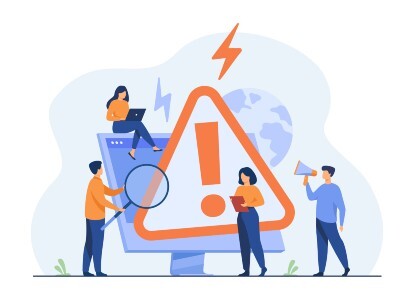
Women over 50 are the fastest growing demographic in the workforce. This means that more women are going through the menopause during their working lives than ever before. But CIPD, the professional body for Human Resources and People Development, reported that almost a million women in the UK have left jobs because of menopausal symptoms. This is often when women are at the peak of their careers. So, employers must get the right support in place, or they risk losing a wealth of experience and talent.
Tuesday 18th October 2022 is World Menopause Day, and the aim is to raise awareness about what is often seen as a taboo subject, especially in the workplace. Here at The Works Search we talk to many HR professionals and senior managers who can affect change in their companies, so we decided to share our advice. The more we talk about the menopause, the more we normalise it, and the better equipped we are to manage the menopause for ourselves, our friends, our family, and our work colleagues.
Our very own Executive Search Associate Rebecca Haroutunian is also a women’s health coach and Pilates instructor with a special interest in helping women navigate the peri/menopause. Rebecca has written this week’s blog which looks at menopause in the workplace.
What is the menopause?
The menopause is a natural part of ageing for women and will impact all women and men, at some point in their lives. There are three stages – the peri-menopause, the menopause and post menopause. The peri-menopause is the lead up to the menopause. It can be the longest hormonal change in a woman’s life, starting from around 35 years of age and lasting anywhere from 4-15 years. The menopause happens when the ovaries produce so little oestrogen that eggs are no longer released, and this also causes a woman’s period to stop. The menopause is when a woman hasn’t had a period for a full year, so, it is just one moment in time, then you’re post-menopausal. Menopause can also be triggered by POI (premature ovarian insufficiency), surgical interventions and chemotherapy. It’s important to remember that trans, intersex and some non-binary people can experience the menopause, as this also applies to anyone who has had their ovaries removed.
What are the symptoms?
Research shows that there can be more than 30 potential symptoms associated with menopause. The NHS categorises these as mental health symptoms and physical symptoms. Common mental health symptoms include changes to your mood, anxiety, and brain fog. Physical symptoms can include hot sweats, muscle aches, and heart palpitations. Some women will sail through the menopause whereas others will suffer from night sweats, forgetfulness or interrupted sleep, which will affect every aspect of their lives.
Hormones
What is happening is a women’s sex hormones are fluctuating, so the menopause can be thought of as a hormone deficiency followed by a rebalancing. Primarily it is oestrogen as well as progesterone and testosterone which are fluctuating and causing the symptoms, and the symptoms of the menopause can vary wildly from individual to individual. We have oestrogen receptors in every single cell of our body so it’s no surprise that women might experience symptoms from nose to toes.
Diagnosing menopause
In the UK, the average age a woman will reach menopause is 51, though anywhere between 45 and 55 is still considered to be within the normal range. Blood tests to measure hormone levels are not necessary for most women at menopause as the reality is that symptoms are often a better indicator. This is because during the perimenopause, hormone levels can be all over the place so it's just a snapshot in time. Therefore, it is useful to use an app like Balance Menopause to monitor your symptoms.
Help with symptoms
One of the main medical treatments for menopausal symptoms is hormone replacement therapy, or HRT. The right combination of HRT can help relieve menopausal symptoms and there is also evidence to show that taking it reduces the risk of cardiovascular disease (heart attacks and strokes) and the risk of developing osteoporosis. But not everyone will be able to or want to take HRT so it is useful to also know about lifestyle changes that can help.
As a Women’s Health coach, I provide menopause training to companies. As part of this I always emphasise the importance of making lifestyle changes to manage the symptoms of menopause. This can range from a healthy eating plan, calcium for bone density, activities to reduce stress and anxiety, such as massage, yoga, meditation, and walking. It is also useful for employers to recognise the importance of lifestyle factors to help with menopause symptoms.
Menopause and the workplace
Research by CIPD showed that 59% of women said menopause has a negative impact on their work, 30% said they had been unable to go into work because of their symptoms, while only a quarter felt able to tell their manager the real reason for their absence.
The CIPD recommends that employers educate and train line managers so they can have sensitive conversations with staff about their symptoms and changes needed. These may include practical help such as fans at work, flexible working hours, different start times and regular breaks. The CIPD offers free guidance on managing the menopause at work. These small changes can make a big difference and allow women to manage their symptoms and thrive in their jobs.
Menopause policy
While it’s not yet a legal requirement to have a menopause policy, it is seen as good practice. It can provide a framework and point of reference for staff and enables employers to start an open and honest conversation in a sensitive way.
However, many organisations do not have the resource, or access to guidance and support to put such measures in place. So, the CIPD has outlined four pillars of support that organisations should focus on:
It goes on to say there are many practices organisations can put in place to create menopause friendly workplaces. This could include gaining critical senior level buy in; setting up menopause networks/support groups of employees; ensuring all colleagues are part of the conversation; providing accessible menopause resources; offering flexible working and reasonable adjustments; treating menopause as a long-term health condition in the absence policies; considering workplace environment adjustments such as temperature control or rest breaks; and ensuring line managers are trained to be compassionate and aware to talk about the menopause.
The aim is to create a culture where the menopause is not just a female issue and Anna Allerton, Director at Allerton Coaching, gives advice on how to have better conversations around menopause.
A role for the government?
A recent report from the All-Party Parliamentary Group on Menopause (12.10.22) recommends that there is a role for both Government and employers to work together to drive forward this change. Recommendations include:
Final thoughts…
By developing a culture where it’s safer and easier to talk about the menopause, we are supporting and preventing the loss of valuable employees. Individuals affected by the menopause can lose confidence in their abilities, and in some circumstances leave their job (source ACAS).
But we are already beginning to see the tide of change as the menopause has begun breaking through into public discourse and more people are now talking about it. In fact, the menopause can also be a very liberating time for women giving them a new sense of freedom and opportunity.
Useful external reference sources:
British Menopause Society,
NICE Guidelines
Dr Louise Newson
Menopause Matters
The Daisy Network (for early menopause advice)
NHS and the menopause
Talking Menopause
For a free download of our full Annual Salary Guide 2022, click here.
Time for a change? Check out our latest jobs!
The Works Search: a search consultancy specialising in PR and corporate communications. We have unrivalled matching abilities and known for finding the top 5% performers in the industry - the ones who deliver and make your reputation great. For more advice or market insights, do get in touch with us on 0207 903 9291 or email sarah@the-works.co.uk.


